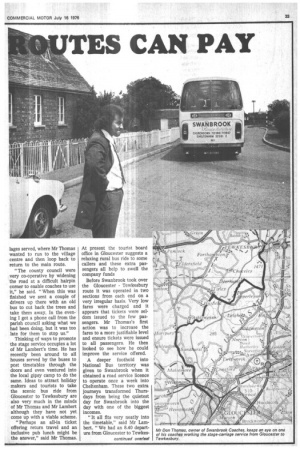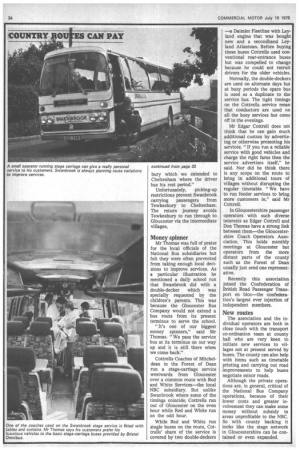TES CAN PAY
Page 35

Page 36

If you've noticed an error in this article please click here to report it so we can fix it.
lages served, where Mr Thomas wanted to run to the village centre and then loop back to return to the main route.
"The county council were very co-operative by widening the road at a difficult hairpin corner to enable coaches to use it," he said. "When this was finished we sent a couple of drivers up there with an old bus to cut back the trees and take them away. In the evening I got a phone call from the parish council asking what we had been doing, but it was too late for them to stop us."
Thinking of ways to promote the stage service occupies a lot of Mr Lambert's time. He has recently been around to all houses served by the buses to post timetables through the doors and even ventured into the local gipsy camp to do the same. Ideas to attract holiday makers and tourists to take the scenic bus ride from Gloucester to Tewkesbury are also very much in the minds • of Mr Thomas and Mr Lambert although they have not yet come up with a viable scheme.
"Perhaps an all-in ticket offering return travel and an inclusive pub lunch might be the answer," said Mr Thomas. At present the tourist board office in Gloucester suggests a relaxing rural bus ride to some callers and these extra passengers all help to swell the company funds Before Swanbrook took over the Gloucester Tewkesbury route it was operated in two sections from each end on a very irregular basis. Very low fares were charged and it appears that tickets were seldom issued to the few passengers. Mr Thomas's first action was to increase the fares to a more justifiable level and ensure tickets were issued to all passengers. He then looked to see how he could improve the service offered.
A deeper foothold into National Bus territory was given to Swanbrook when it obtained a road service licence to operate once a week into Cheltenham. These two extra journeys transformed Thursdays from being the quietest day for Swanbrook into the day with one of the biggest incomes.
"It all fits very neatly into the timetable," said Mr Lambert. "We had an 8.40 departure from Gloucester to Tewkes bury which we extended to Cheltenham where the driver has his rest period."
Unfortunately, picking-up restrictions prevent Swanbrook carrying passengers from Tewkesbury to Cheltenham. The return journey avoids Tewkesbury to run through to Gloucester via the intermediate villages,
Money spinner
Mr Thomas was full of praise for the local officials of the National Bus subsidiaries but felt they were often prevented from taking .enough local decisions to improve services. As a particular illustration he mentioned a daily school run that Swanbrook did with a double-decker which was specially requested by the children's parents. This was because the Gloucester Bus Company would not extend a bus route from its present terminus to serve the school.
"It's one of our biggest money spinners," said Mr Thomas. "We pass the service bus at its terminus on our way up and it is still there when we come back."
Cottrells Coaches of Mitcheldean in the Forest of Dean run a stage-carriage service westwards from Gloucester over a common route with Red and White Services—the local NBC subsidiary. But unlike Swanbrook where some of the timings coincide, Cottrells run out of Gloucester on the even hour while Red and White run on the odd hour.
While Red and White run single buses on the route, Cottrells' share of the service is covered by two double-deckers —a Daimler Fleetline with Leyland engine that was bought new and a secondhand Ley land Atlantean. Before buying these buses Cottrells used conventional rear-entrance buses but was compelled to change because he could not recruit drivers for the older vehicles. Normally, the double-deckers are used on alternate days but at busy periods the spare bus is used as a duplicate to the service bus. The tight timings on the Cottrells service mean that conductors are used on all the busy services but come off in the evenings.
Mr Edgar Cottrell does not think that he can gain much additional custom by advertising or otherwise promoting his services. "If you run a reliable service with good vehicles and charge the right fares then the service advertises itself," he said. Nor did he think there is any scope on the route to bring in additional tours of villages without disrupting the regular timetable. "We have to run feeder services to bring more customers in," said Mr Cottrell.
In Gloucestershire passenger operators with such diverse interests as Edgar Cottrell and Don Thomas have a strong link between them—the Gloucestershire Coach Operators Association. This holds monthly meetings at Gloucester but operators from the more distant parts of the county such as the Forest of Dean usually just send one representative.
Recently this association joined the Confederation of British Road Passenger Transport en bloc—the confederation's largest ever injection of independent members.
New routes
The association and the individual operators are both in close touch with the transport co-ordination team at county hall who are very keen to initiate new services to villages not at present served by buses. The county can also help with items such as timetable printing and carrying out road improvements to help buses negotiate minor roads.
Although the private operations are, in general, critical of the National Bus Company operations, because of their lower costs and greater involvement they can make some money without subsidy in areas unprofitable to the NBC. So with county backing it looks like the stage network in Gloucestershire can be contained or even expanded,




































































































